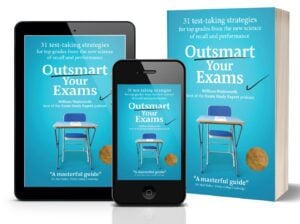Personal statements are hard to get right. With so many talented students applying for the same courses, how can you make sure that you stand out for all the right reasons?
The personal statement (or ‘personal’ or ‘college admissions’ essay for our American audience!) is your chance to speak directly to the University admissions team and tell them why you are the best student for their course. But with this great opportunity comes great stress!
Trying to write a personal statement that is the right balance of academic potential and personality is hard – especially is less than 1000 words!
Whether it’s the last month of your holidays, or even last few days before your deadline, we are here to help! In this article I’ll be sharing our top tips to help you nail your personal statement, secure an interview (if applicable) and get that University offer.
Let’s get started!
What is a personal statement?
Before we get into the nitty gritty of how to write a personal statement for university, let’s have a quick recap: what is a personal statement?
A personal statement has one goal: to demonstrate that you are the best student for the course, over and above the other applicants. You want to display your unique characteristics as a student, beyond your grades and subject choices.
What are the differences between personal statements in the UK and US?
In the UK, personal statements are submitted as part of the UCAS application, and be seen by all of the 5 universities you apply to – you only need to write one personal statement.
You’re allowed up to 4,000 characters, about 600-1000 words. The personal statement tells the story of you as a student: your passions for your subject, why you would be a good fit for the course, and what you bring to the university.
Writing a good personal statement for university is therefore a balance between your academic strengths and additional qualities.
In the US, you can write multiple personal essays and submit these separately to each University, or write a single personal essay for several Universities, as part of the ‘Common Application’.
These are much shorter, around 400-600 words, and are usually written as an answer to a specific question. Writing a good personal statement for US universities requires a stronger focus on you as an individual, separate from your grades.
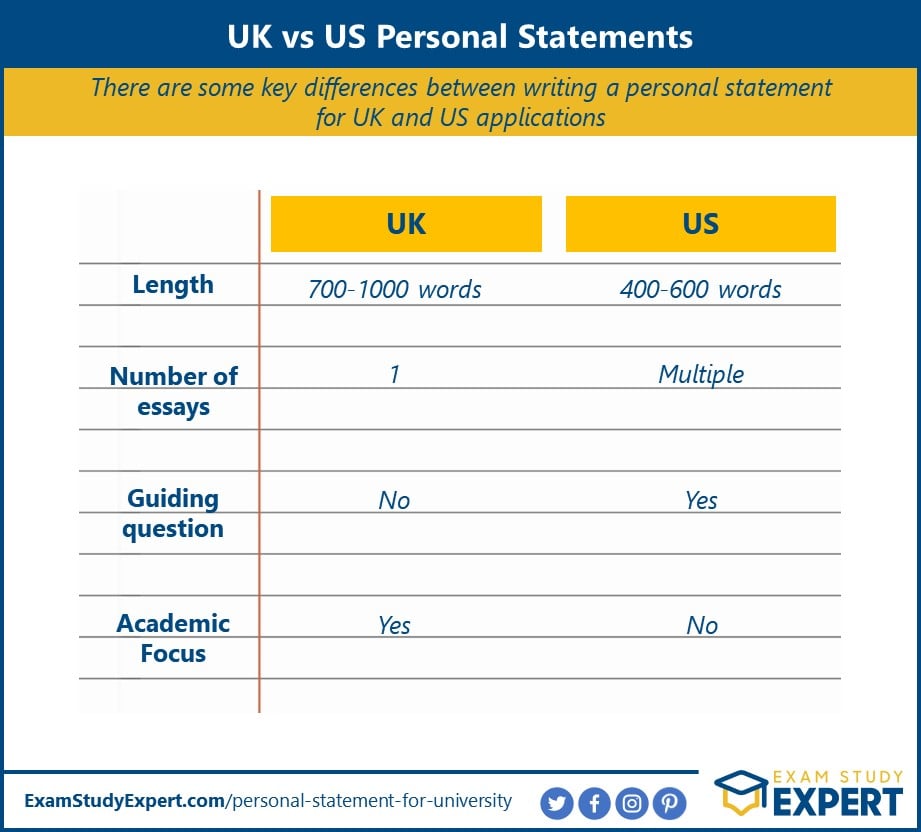
What should go in my personal statement?
A successful personal statement will support your application using information across two categories:
Academic evidence: Will you be able to keep up with the pace at University?
How you feel about your studies: Are you enthusiastic and motivated both by your subject, and by learning in general?
These can be demonstrated across five crucial aspects:
- Your track record of achievement
- Your skills & aptitude for the specific course
- Your enthusiasm for the subject
- Your enthusiasm for studying, in general
- Your individuality – what makes you special
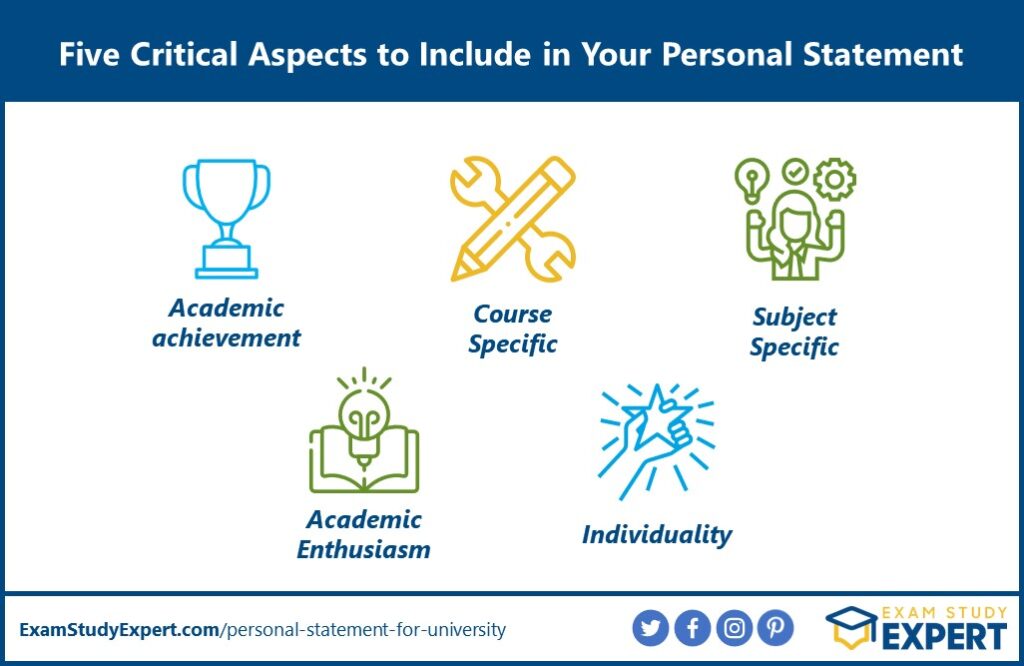
For each of these five aspects make sure you have specific and descriptive examples that you can weave together to tell your student story. To get you started, here are our top 3 DO’s and DON’Ts:
What should I include when writing my personal statement?
To make your personal statement reflect you as an individual, make sure you include a healthy dose of:
- Your subject beyond the classroom – What have you done that reflects your interest in the subject? Here are three examples:
- Public lectures & Exhibitions
- Museums & Galleries
- Books & Documentaries
- Achievements –These can serve a dual-purpose showing both academic achievement and passion for your subject. Such as:
- Competitions e.g. Olympiads
- School Subject Awards
- Additional Courses
- Any non-academic extra-curriculars – These can show individuality and transferable skills, e.g. positions of responsibility, organisation, teamwork, critical thinking etc. For example:
- Sports, Music & Drama
- Volunteering
- School Committees
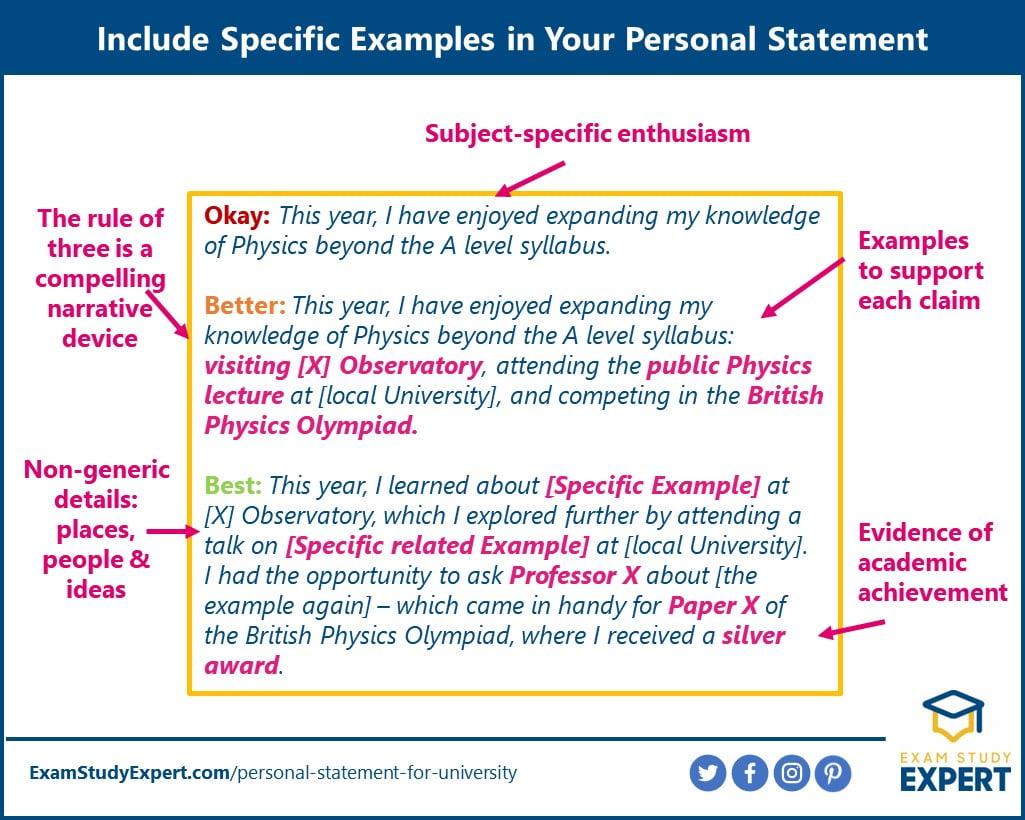
What should I avoid when writing my personal statement?
When writing your personal statement just remember to avoid these 3 common pitfalls:
- Being too ‘out there’ – don’t try too hard to be different and stand out for all the wrong reasons.
- Grammatical and spelling mistakes – these suggest little effort or poor time management. Use Grammarly* and spellcheck to avoid these!
- Being too specific about your future plans – a lot can change during the time between submitting your application, and your future career. Write instead about intermediate steps, or qualities and skills you’re excited to develop during University.
And remember, consistency and accuracy will make for a far more impressive and memorable application than a gimmick.
Use these examples to paint a colourful picture of you as a student, and avoid writing a long list of disconnected achievements!
How to write a personal statement for university
We’re going to work through the steps of drafting, editing and finalising your personal statement. Pens at the ready!
Before getting started
Set up your desk or workstation, remove all your distractions (mobile phone, I’m looking at you!), and take a deep breath.
Note: we recommend taking a few days to complete these. If you’re pushed for time, do the first activity, take a short break, and find the most obvious narrative that connects the majority of the ideas in your brain dump.
Writing a good first draft of a personal statement
Staring at a blank page can be terrifying – I’ve been there! To avoid writer’s block, don’t jump in to trying to write the perfect personal statement on your first go – try these three activities:
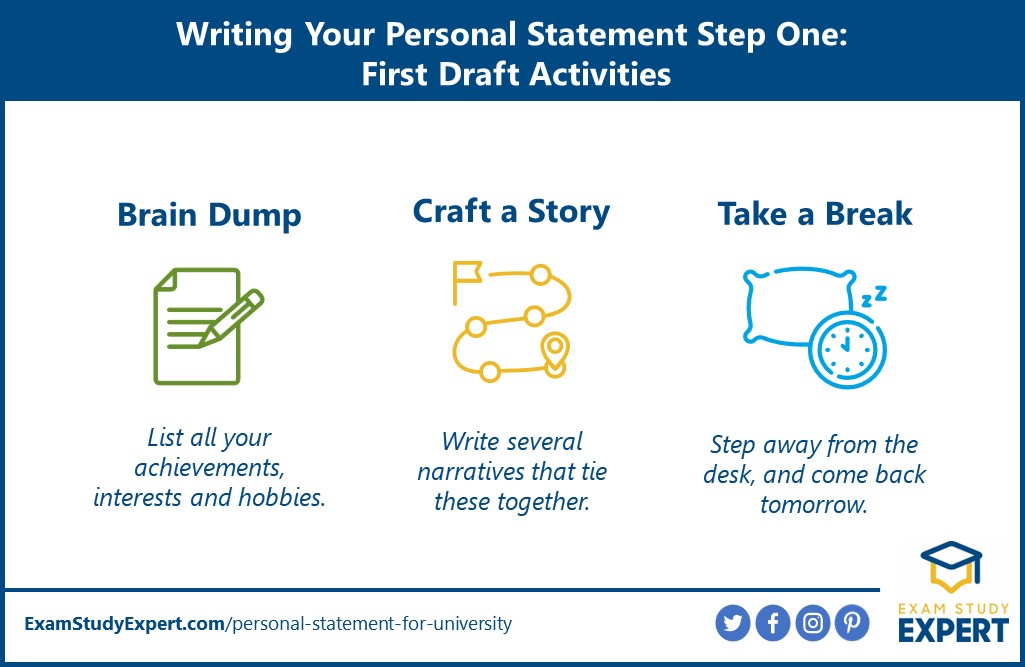
Our first activity:
Do a brain dump onto a blank page. Look at the five aspects we’ve suggested for what to include when writing your personal statement (see above!) and write as much as you can for each of them.
Write down every single idea even if you think they’re bad! Bad ideas can be improved later on, or can lead to a better idea.
Our second activity:
Once you’ve got a list of ideas, try and make them into different possible stories.
Think of multiple narratives for your statement, and try them out on someone else e.g. a parent, tutor, or older peer who has already gone through the process – which do they think is the most compelling and true to your experiences?
Finally, our third activity:
Take a break!
Give yourself time away to reflect – your subconscious will work on ideas, and coming back to your ideas with fresh eyes can give you a new perspective.
When you come back to the list of possible narratives, use your gut feeling (and friends’ and family’s advice!) to choose the story that you think is best.
3 tips for turning your rough narrative into a first draft
Once you’ve got a coherent narrative, packed full of specific examples that represent the best examples of your academic achievements, interests and passions, it’s time to get that first draft written!
Here are our top three tips to getting that first draft onto the page:
- Just get started, and start anywhere – it’s critical to get words on the page early. You can start from the middle, the end – anywhere!
- Don’t get hung up on the opening phrases or sentences of any section. If you’re stuck, leave a placeholder note and start writing from the second sentence. This allows you to keep writing, and the opener may become obvious once the rest of the statement has been written and the narrative is clear.
- Allow the first draft to be bad – it’s easier to edit a draft than to write from scratch.
Allow yourself time, and don’t aim for perfection – you are laying the foundations, and they don’t have to be pretty!
How to start and end your personal statement
Once you’ve got a good first draft, its time to think about how you’re opening and closing your personal statement. This is where you introduce yourself as a candidate, set the scene, and leave a great last impression.
It’s easy to overthink the start and end of the personal statement, so read on for our best advice!
How to start a personal statement
It’s easy to get stuck for ages looking for the ‘perfect’ first sentence. Don’t get stuck overthinking it!
Don’t:
- Use gimmicks, rhetorical questions and quotes.
But do:
- Be specific – not just ‘I find this subject fascinating’, but what aspect do you find fascinating.
- Be concise – get into the main body of the statement rather than waffling.
Hint: Find some inspiration for starting your personal statement – check out our guide on creative ways to start an essay.
How to end a personal statement
Equally, it’s tempting to spend hours looking for a rousing and memorable conclusion – think of it instead as a chance to reinforce the great points you’ve made throughout the statement.
Don’t:
- Reiterate points, unless it’s to draw together ideas introduced separately throughout the statement into a cohesive theme
- Introduce new information, but you can end on a fresh idea e.g. looking to the future.
But do:
- Think about how it connects to your opener – it should feel like the conclusion to the story.
Don’t panic if you don’t open and close your personal statement with something ‘original’ – the main body of the statement is where the important content lies.
How to edit & revise your personal statement
Once you’ve got a comfortable first draft, and great opening and closing sentences, you’ll want to polish up the main body of the personal statement. Here are some practical exercises to take you from your first draft to a fantastic final draft that you can be proud of.
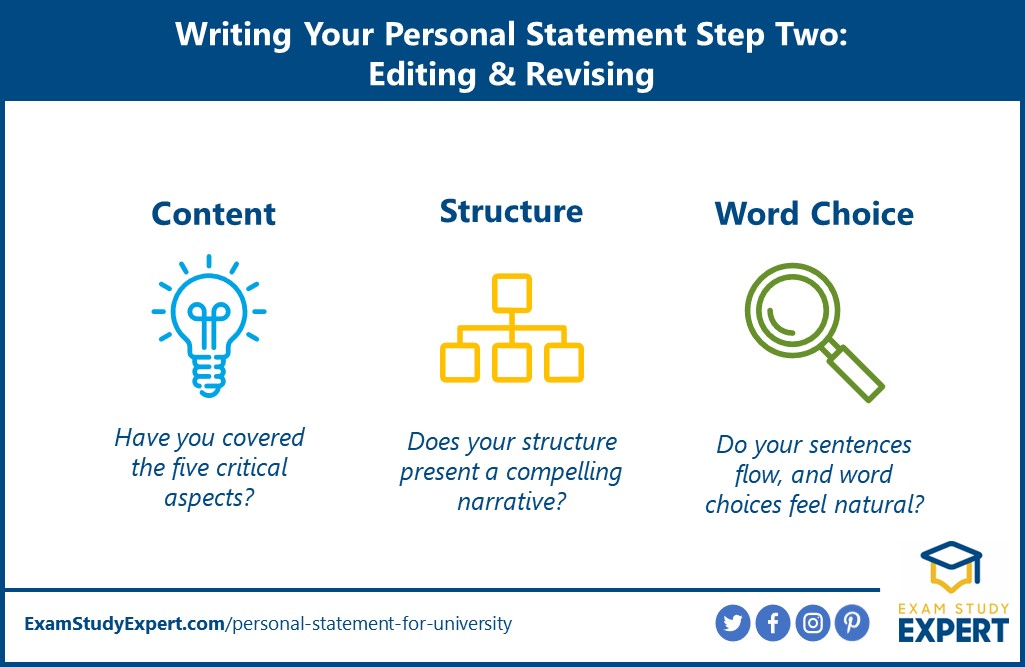
First pass – finalising your content:
Once you have your first draft, its time to see if you want to add or remove any content to ensure that you’ve loaded your statement with specific examples that add value.
Go through with a highlighter, one colour for each of the 5 criteria given above, and highlight sentences that exhibit these. Then have a look:
- If there are any blank sentences – what are they adding to the statement? Can they be cut, or made relevant?
- Have you included examples from each category? They don’t need to be evenly distributed, but you want to have evidence for every point.
Second pass – finalising your structure:
Once you’ve decided on your content, it’s time to ensure that you’ve organised it into the best possible structure.
Read your personal statement out loud, or even better, read it to another person. Ask the following three questions:
- Does the statement form a coherent narrative? If you can rearrange the paragraphs and it makes the same sense, then you need to restructure the paragraphs to form a narrative where each paragraph builds on the previous one.
- Is it an accurate representation (on a good day!) of you as a student or person? Make sure you’re emphasising your positive qualities, but not masquerading as somebody else.
- Does it sound like the university course that you’ve applied for is the natural next step for your path as a student?
Third pass – final edits to your word choices:
Once you’ve made your second pass changes, you’re down to the nitty-gritty! You’re no longer thinking about content to add, or rearranging the structure, but final word choices. Follow these final three steps:
- Do a final out-loud read through to yourself or a helpful peer – now you’ve spent time writing and re-writing, your eyes will skip over obvious mistakes so hearing it out loud can reveal any hidden errors.
- Look at the words you’ve used – do any feel out of place, or are some phrases repeated often? Look for synonyms that feel natural. Here are some good ideas for academic writing and paragraphs:
- Sleep it on it a final time, and re-read it once more. You’re done!
Congratulations and good luck!
Now that you’ve written a fantastic personal statement, all that remains is to wish you the very best of luck with your University application!
If you’d like any more advice about writing your personal statement, you can listen to Episode 86 of the Exam Study Expert Podcast “Writing a Stand-Out College Essay” for some further tips.
OR you can book in for a coaching session with me, for one-on-one personalised advice about your personal statement, University application, or advice about how to choose the most effective study strategies to make sure you ace your exams!
And don’t forget to sign up below for more expert tips about how to study smarter, not necessarily harder!
Wishing you every success!
*Please note: Grammarly is one of very few products we’re sufficiently enthusiastic about to recommend to our Exam Study Expert readers, and we may earn a small commission if you sign up to Grammarly services through the above link.

